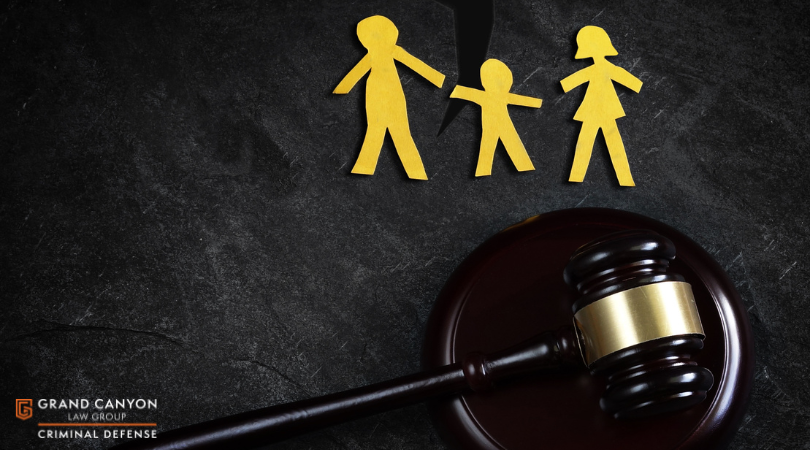Supporting Your Child in Maricopa Juvenile Court

Receiving the news that your child has been arrested is an overwhelming experience for any parent. At Grand Canyon Law Group, we understand the fear and confusion that comes with navigating the juvenile court system in Maricopa County. To support parents during this challenging time, we’ve outlined what you need to know to help your child through the process and secure the best possible outcome.
How Does Juvenile Court Work in Maricopa County?
Juvenile court is designed to be different from adult court. While the situation is serious, this system focuses on rehabilitation rather than punishment. The goal is to help minors learn from their mistakes and move forward.
Key Differences Between Juvenile and Adult Court:
- Confidential Proceedings: Juvenile cases remain private to protect the minor’s future.
- Focus on Rehabilitation: The court prioritizes helping the minor over penalizing them.
- Judicial Understanding: Judges recognize that minors make mistakes and aim to guide them toward positive change.
- Variety of Support Options: Rehabilitation programs and counseling are common outcomes.
- Access to Family Services: Support services for families are available throughout the process.
The Juvenile Court Process: What to Expect
Understanding the steps involved can help parents stay informed and prepared:
1. Detention Hearing (First 24 Hours)
This initial hearing takes place within 24 hours of the arrest. The judge decides whether the minor will be released or remain in detention until the case is resolved. Bringing relevant documents can strengthen your position:
- School records
- Character letters
- Proof of employment (if applicable)
- Medical records (if relevant)
2. Adjudication (The “Trial”)
This is the court session where evidence is reviewed, and the minor’s attorney presents their defense. The process includes:
- Review of evidence by the judge
- Testimonies from witnesses
- A decision on whether the minor is “responsible” (guilty) or not
3. Disposition (The Outcome)
If the judge finds the minor responsible, they will issue a disposition plan, which may include:
- Probation with specific conditions
- Counseling or therapy
- Drug testing (if relevant)
- Community service
- Educational programs aimed at rehabilitation
Supporting Your Child During the Process
Parents play a critical role in their child’s journey through juvenile court. Here’s how to provide support:
1. Choose the Right Attorney
Select an attorney who specializes in juvenile law in Maricopa County. Look for qualities such as:
- Extensive experience in handling juvenile cases
- Knowledge of local laws and court practices
- Clear communication and transparency
2. Create a Stable Home Environment
Establishing structure at home can help reinforce positive behavior:
- Set clear boundaries and expectations.
- Maintain consistent routines.
- Monitor activities and friendships.
- Stay actively involved in your child’s education.
3. Utilize Available Support Services
Take advantage of the programs offered in Maricopa County, including:
- Family counseling services
- Substance abuse treatment programs
- Educational support services
- Mental health resources
Frequently Asked Questions
Q: Will this stay on my child’s record permanently?
A: Not always. In Arizona, juvenile records can often be sealed or set aside when the child turns 18, particularly if all court requirements have been met.
Q: What if we can’t afford an attorney?
A: Your child has the right to a public defender. However, private representation often means more dedicated attention to the case.
Q: How long does the process take?
A: Most juvenile cases in Maricopa County are resolved within 2-4 months, though more complex cases can take longer.
Next Steps for Parents
Document Everything:
- Keep a detailed timeline of events.
- Save court notices and related paperwork.
- Write down any questions for your attorney.
Build a Support Network:
- Connect with other parents who have been through similar experiences.
- Join local or online support groups.
- Communicate openly with your child’s school for additional support.
Prepare for a Positive Outcome:
- Work with your attorney to develop a strong rehabilitation plan.
- Explore community service opportunities.
- Look into counseling or treatment programs, if needed.
Moving Forward
While the situation may feel overwhelming, it is temporary. With proper support and guidance, your child can learn from this experience and move forward stronger and wiser. Many teens who go through the Maricopa County juvenile court system go on to lead successful, productive lives.
At Grand Canyon Law Group, we have extensive experience in juvenile defense. We are committed to guiding your family through every step of the process and advocating for your child’s future.
Contact Grand Canyon Law Group today at (480) 573-6441 for a confidential consultation, and let’s work together to help your child move past this challenge and build a brighter future.
